Miami Sea Park Sues Famous Walrus Activist
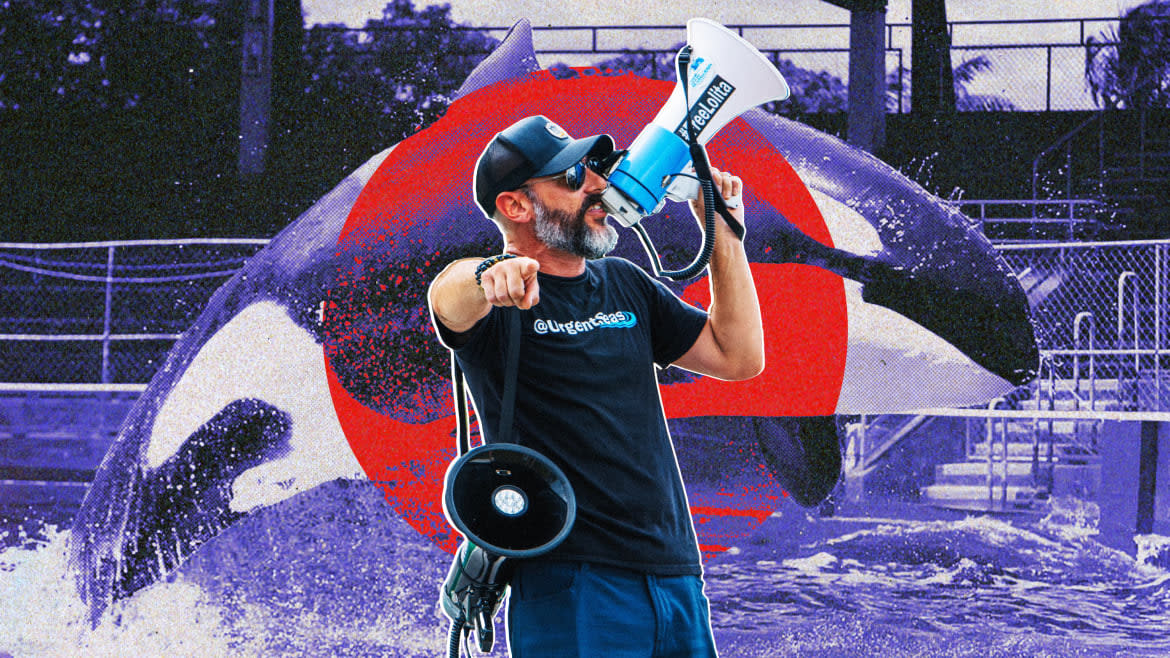
In June 2022, former animal trainer Phil Demers shared aerial footage above the Miami Seaquarium, a Florida tourist attraction where a lonely killer whale was forced to live in a tiny tank and perform for audiences for half a century.
“We flew a helicopter above the Miami SeaQuarium to witness their lone orca Lolita’s living conditions, since her pool is completely cut off to the public,” Demers posted on X, formerly known as Twitter. “WOW. Her suffering is immeasurable. She’s just wasting away in the blistering sun. We gotta get her out of there!”
This was just one video clip Demers shared of Lolita, then the oldest orca in captivity and also known by her indigenous name Tokitae or “Toki.” She died in August before her planned release into ocean waters.
Demers—a brash and unapologetic Canadian—has spent almost two years organizing protests and keeping up the drumbeat to free the park’s animals and shut the facility down, with the help of his 41,000 followers on X and 125,000 on Instagram.
The Fight to Free Smooshi, the World’s Most Famous Captive Walrus
Now he’s locked in a legal battle with the Seaquarium, which sued him last May for trespass, private nuisance and defamation, accusing him of illegally operating a drone to snap footage of its animals and staff.
The feud has gotten so ugly, court exhibits reveal, that the attraction’s head of security discussed collaborating with the Department of Homeland Security (DHS), which he claimed was monitoring Demers’ activities.
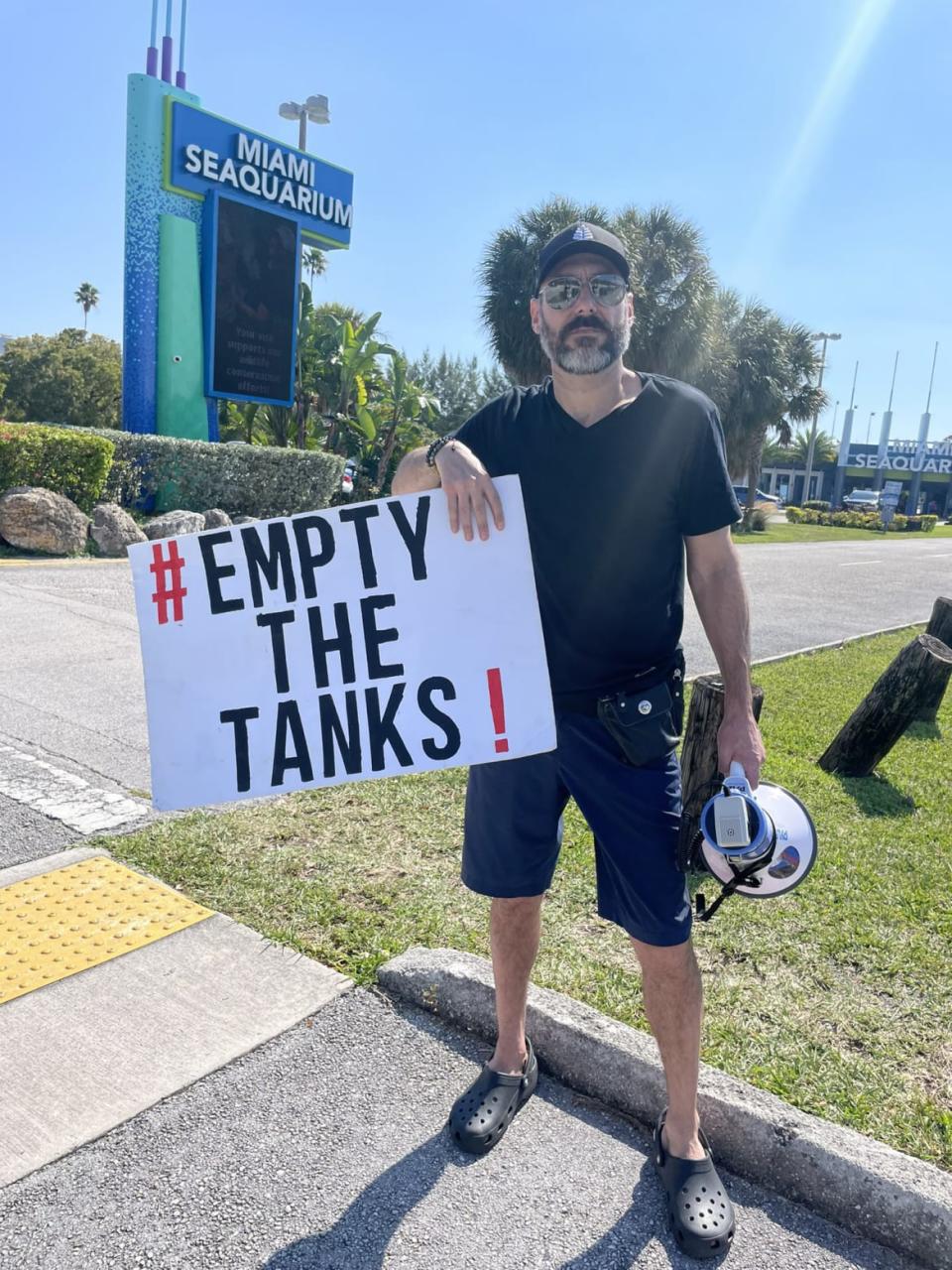
Phil Demers protesting outside Miami Seaquarium.
It’s also become a clash of wills with the CEO of the Dolphin Company, which owns the operator of the park, MS Leisure.
“Hey, Eduardo, I’m in your house here,” Demers, 45, says in a special video message for the chief executive, posted soon after the lawsuit was filed. The activist wears sunglasses, a gloating smile, and a T-shirt with Dolphin Company boss Eduardo Albor’s face, and happy steel pan music plays in the background.
“It’s an empty house and it’s good to see. We’re going to bankrupt you right out of Miami and we’re going to take all your dolphins away soon. See you soon, Eddie.”
This video was taken above the Miami Seaquarium on May 4th, 2023. Lolita, their last surviving orca has been held captive in this tank since 1970. Her last orca tank mate Hugo committed suicide in 1980. Her lengthy captivity and solitary confinement are clearly taking their toll. pic.twitter.com/2SQ6nkAiea
— Phil Demers (@walruswhisperer) May 5, 2023
Albor has not shied away from trading nasty online barbs with Demers either, writing last summer, “If you have the balls, give me your address and I will see you there. Chicken.” In another, he warned, “Keep barking clown. You will regret all you say when you are in court facing counts for all your lies…” Albor then suggested Demers is a “crook” who will one day “be in an all inclusive fed prison.”
In an interview last week, Demers told The Daily Beast being sued only “reinvigorated” him to continue speaking out against the facility.
“The second they sued me I booked a helicopter and flew above them,” he said, adding, “I just saw an opportunity where I had to do something. So no, there’s no way this is going to fucking stop. Not a fucking chance.”
Demers’ lawyer, Chris Carraway, said many accusations in the Seaquarium’s complaint aren’t supported by evidence.
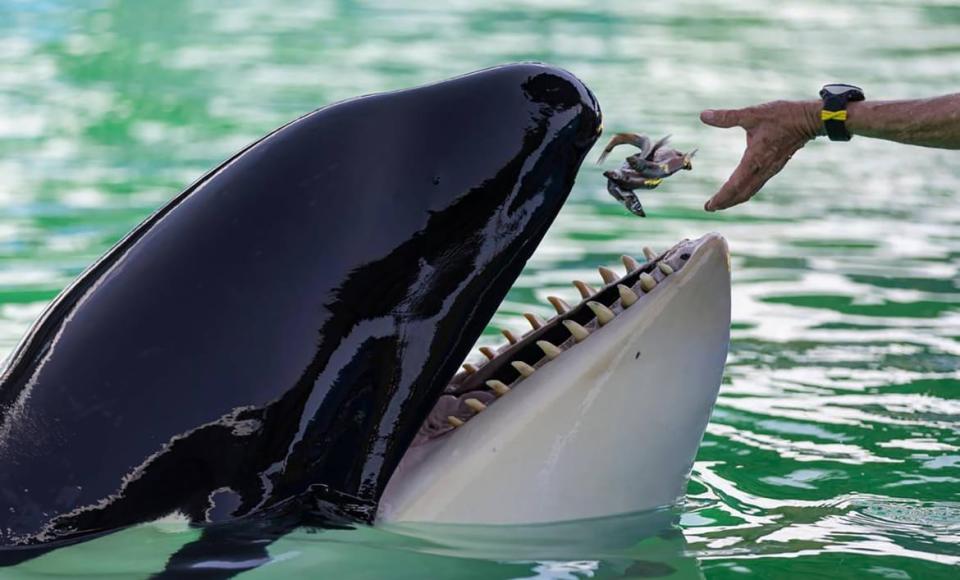
Trainer Marcia Henton feeds Lolita the orca, also known as Tokitae and Toki, inside her stadium tank at the Miami Seaquarium.
“This lawsuit is not about drones. It’s not about helicopters. It’s about Phil’s reach, the impact of Phil’s speech that is making the Seaquarium look bad,” said Carraway, a staff attorney at the University of Denver-based Animal Activist Legal Defense Project (AALDP).
“We’re not making the Seaquarium look bad. The Seaquarium is making itself look bad, but Phil is just exposing it.”
According to the Seaquarium’s complaint in federal court, which was initially filed as a state suit, Demers illegally flew an unmanned aerial vehicle over the property or instructed others to do so and “caused both visual and auditory disturbances to several customers.”
“In addition, several of the photos and videos taken were of animal exhibits which were not open to the public and where employees present maintained an expectation of privacy while conducting their work,” the lawsuit added.
AALDP filed a motion for summary judgment on Wednesday seeking to dismiss the case, which it calls a strategic lawsuit against public participation (SLAPP) “in response to Mr. Demers’ animal rights activism.”
The litigation is firing up as the Seaquarium navigates a sea of bad press. Last week, the park’s chief veterinarian resigned, and in February, newly released U.S. Department of Agriculture (USDA) records revealed inspectors found poor water quality at the facility, a dolphin with a two-inch nail lodged in his throat, another with a broken bolt in her mouth, and a sea lion whose untreated cataracts caused such pain she began refusing food.
The Seaquarium also lost its accreditation from American Humane’s animal welfare certification program, and Miami-Dade County’s Mayor Daniella Levine Cava is demanding the termination of the Virginia Key attraction’s lease on a public waterfront. The venue is also reportedly about $88,000 behind on rent.
When The Daily Beast contacted the Seaquarium for comment on the litigation, a spokesperson instead shared the company’s Facebook post addressing Mayor Levine Cava’s efforts to cut their lease and inviting her to the attraction to “reassure [her] about the animals’ well being.” Attached was a letter from head animal trainer Andrew Scullion to the mayor, with other officials copied including Gov. Ron DeSantis.
“With all due respect,” Scullion’s letter read, “In my 30 years as a professional animal care specialist, working for and with some of the most respected marine animal facilities/companies in the industry, I have never encountered such a coordinated onslaught of prejudiced and purposely distorted judgment towards an individual facility.”
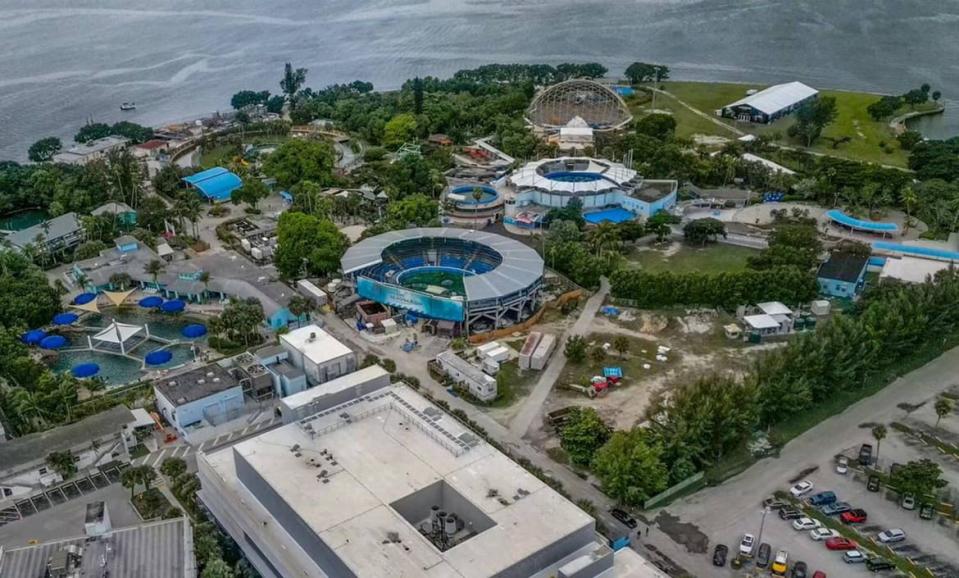
Aerial view of the Miami Seaquarium, including the tank (center) where Lolita the orca lived in captivity for five decades until her death on Aug. 18, 2023.
The Seaquarium and its lawyer didn’t answer follow-up messages.
Despite these mounting problems, Demers says the park won’t drop its claim aimed at silencing him. “You can’t hide the truth in this case, you know, there’s just too many eyes on them,” Demers said. “When people are voluntarily giving me drone footage to publish, I’m not doing anything to those videos,” he added. “All I’m doing is pushing tweets.”
Last May, Demers and fellow animal activists organized one of several protests outside the Seaquarium. Around the same time, the park was apparently seeking help from DHS in dealing with him.
Court records show that Jamie Mayorga, the park’s director of safety and security, sent emails to coworkers in June stating that “Miami Dade Police, Homeland Security & the FBI are in the loop of his [Demers’] videos that he posted.” He added that DHS had “assigned a detective to this case.”
In another email, Mayorga said he spoke with a DHS detective, who indicated the agency had “significant information” on Demers and “will be monitoring his activities.”
“He informs me the FBI is the current lead investigator on this case however if Philip does arrive at our park we are to call the detective asap as they would like to do some undercover work to film his actions while onsite or outfront,” Mayorga continued.
Demers’ attorneys filed Freedom of Information Act requests with the FBI and DHS seeking all records relating to their client.
The Mexico-based Dolphin Company, which operates 31 other theme parks around the world, acquired the Seaquarium from Palace Entertainment, a subsidiary of Spanish firm Parques Reunidos, in late 2021.
A change in hands, however, didn’t appear to greatly improve public sentiment toward the facility, which faced years of criticism over the animals in its care. A USDA report released in September 2021 underscored Lolita’s treatment in particular.
One former veterinarian at the facility objected to a training curator reducing Lolita’s food and shared concerns about “the incorporation of fast swims and big jumps into training sessions and shows for this geriatric whale,” the document stated. According to the vet, Lolita, then 56, was injured after she “hit her lower jaw, likely at the lower flume/bulkhead during fast swims.” While the vet ordered staff not to request “head-in entry jumps” from Lolita, these instructions were allegedly disregarded.
Other issues detailed in the report included animals being fed rotting fish; “an increased algae and parasite load in the water” that led to dolphins, sea lions, and manatees twitching and self-mutilating; and pools that “lacked sufficient shelter to protect the animals from direct sunlight.” The park’s former longtime vet told the Miami Herald that incompatible dolphins were placed together and began violently fighting one another.
The Whistleblower Who Fought to Expose Smooshi the Walrus’ Ugly Alleged Abuse
The Herald also highlighted “an unusual number of deaths” at the park, which lost five bottlenose dolphins and a baby sea lion between March 2019 and April 2020. Of those, two dolphins and the sea lion died from trauma to the head and neck, and another dolphin got caught in a net separating two pools and drowned.
In February 2022, Lolita again received media attention after PETA claimed whistleblowers had reported she was “deathly sick” with pneumonia.
The USDA granted MS Leisure its exhibitor license a month later—so long as Lolita and a 40-year-old dolphin named Li’i, who shared her tank, would be retired.
The news reignited calls for the aging orca’s freedom. Lolita was about 4 years old in 1970 when hunters snatched her away from Washington’s Puget Sound, in roundups that killed other orcas in the pod, and sold her to the Seaquarium for $20,000. She would spend decades performing for crowds twice a day, seven days a week.
Environmentalists, animal activists, and politicians had long demanded her release, as did the Lummi Nation, an indigenous tribe in the Pacific Northwest that called it their “sacred obligation” to return her to home waters.
In March 2023, the Seaquarium owners announced they were working on obtaining regulatory approvals to relocate Lolita to an ocean sanctuary, a mission that Jim Irsay, billionaire owner of the NFL’s Indianapolis Colts, had pledged to fund.
This vid was taken on Apr. 2, 2023 above the Miami Seaquarium Whale Bowl, home to Tokitae (orca) and Li’i (pacific white sided dolphin). Sadly, they are no longer on public display as tank and water conditions dangerously deteriorate. They need to be rescued before it’s too late. pic.twitter.com/n5LeIWSTKB
— Phil Demers (@walruswhisperer) April 6, 2023
Demers posted an aerial video of the tank Lolita shared with Li’i days later. “Sadly, they are no longer on public display as tank and water conditions dangerously deteriorate,” Demers wrote on X. “They need to be rescued before it’s too late.” (Li'i was relocated to SeaWorld San Antonio in September.)
His nonprofit UrgentSeas posted footage in July showing Lolita cordoned off in a small section of her tank, writing that she was “without shade or escape from the scorching sun” during a heat wave. “There’s no excuse for this abuse,” the post said.
Lolita died in August before her Salish Sea homecoming. According to a necropsy, her cause of death included kidney failure, pneumonia, and other chronic ailments.
Albor tweeted in response to critics who blamed him and the Seaquarium for the whale’s demise: “We did not built [sic] this tank 53 years ago nor went out to capture Lolita from the wild. I was barely learning to walk 53 years ago. We came 18 months ago to try and look for an opportunity to ammend [sic] something we did not do nor create.”
Still, Demers has vowed he won’t stop until the Seaquarium is “reduced to dust.” After Lolita’s death, he has remained a thorn in the attraction’s side.
UrgentSeas shared a TikTok video in November of the Seaquarium’s 67-year-old manatee Romeo spinning alone in a decrepit pool closed off from the public. The footage went viral with 29.8 million views, leading to the Seaquarium to relocate Romeo and another elderly manatee, Juliet, to ZooTampa.
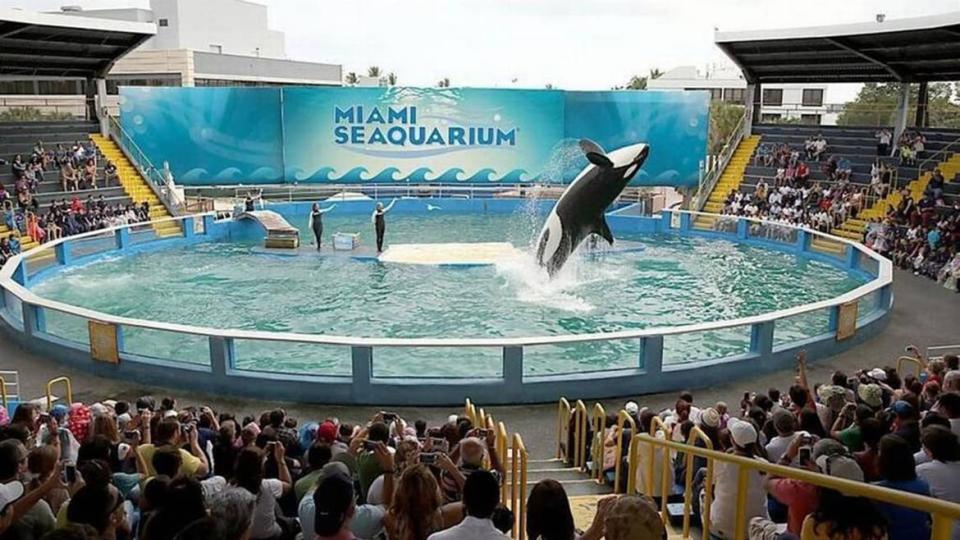
Lolita the orca performing at the Miami Seaquarium.
The fight isn’t Demers’ first rodeo. The former animal trainer spent a decade battling his ex-employer, Canada’s Marineland, in court before settling in 2022. The late owner John Holer sued him, alleging he plotted to kidnap Smooshi, a beloved walrus whose bond with Demers made for heartwarming TV segments. Demers, in turn, accused Holer of defaming and blaming him for a series of newspaper investigations into Marineland. As part of their legal settlement, Smooshi and her calf were rehomed in SeaWorld Abu Dhabi.
In the Seaquarium case, Carraway said the park is targeting Demers with a SLAPP action to silence him and other activists. He points out that MS Leisure, in a response to Demers’ motion to dismiss, wrote that the lawsuit’s “primary purpose” was to “seek damages causes [sic] by Defendant’s unprotected speech.”
“So they are themselves admitting the purpose of the entire lawsuit, not just the defamation claim, is because of his speech,” Carraway told The Daily Beast.
Lawyers for the park argued in pleadings that Florida’ anti-SLAPP statute doesn’t apply because Demers’ “statements are false and therefore not protected First Amendment speech” and “do not involve a public official or a matter of public concern.”
In a proposed amended complaint, the Seaquarium refers to Demers’ Marineland activism, alleging that “he called for his community of followers to ‘get twenty people in every corner of the park [Marineland Canada] and fucking ransack it.’”
The complaint claims that Demers has “weaponized his social media platforms to call for violence against these aquariums” and “has now directed those same misguided efforts in the direction of the Miami Seaqurium [sic].”
On Friday, the Seaquarium filed a legal pleading that accuses Demers of using “extremely violent and threatening tactics in his misguided pursuit to cripple” animal captivity businesses like theirs “both financially and reputationally.”
Demers’ team, in their own motion, argue that “incomplete, out-of-context video of Mr. Demers making hyperbolic threats against Marineland Canada personnel” should be excluded from the case as irrelevant and unfairly prejudicial.
Carraway told The Daily Beast in a statement: “Mr. Demers has never advocated for property destruction or violence against the Miami Seaquarium, nor have any of his actions or protests been unlawful or violent. Full stop.”
Still, Demers or his agents were so troublesome, the Seaquarium’s proposed suit says, that the Seaquarium had to “implement a drone defense system to monitor the property’s airspace and notify the park in real time of any unauthorized drone flyovers.”
For his part, Demers denies ever flying drones or directing others to fly them over the property. “Others routinely send me unsolicited news, footage, and photos related to issues of marine mammal captivity,” he said in a recent court declaration.
Demers’ lawyers, in a motion for summary judgment, say the Seaquarium “has no evidence tying Mr. Demers to the drones that it claims flew over its property” and has admitted itself that some flights “did not go near its facility or the animals it holds captive there.”
The Seaquarium “can only point to a few social media posts where Mr. Demers posted footage taken from a drone, but conceded this alone is insufficient,” the motion alleges.
Legal filings show that the Seaquarium called cops on another man who flew a drone above the facility on the same day that protesters gathered outside but park honchos haven’t pursued legal action against him.
The Seaquarium conducts its own drone flights over the park and “has flown its drone as close as 10 feet above their animals,” Demers’ team adds in a statement of undisputed facts. “No animal at the Seaquarium was harmed or otherwise affected by any drone identified in the Complaint or discovery.”
Demers also could not have trespassed at the Seaquarium’s Flipper Stadium to snap video, since he “was gifted a ticket and was granted entry,” the filing says.
As a marine animal trainer for 12 years and an anti-captivity advocate for another 12, Demers says he’s uniquely positioned to expose the Seaquarium’s “bullshit.”
“I’ve seen awful conditions that orcas have lived in,” Demers told the Daily Beast. “I see what solitary confinement has done to orcas.”
As for Lolita, he said, “I watched her behavior and I watched her deteriorating in front of my very eyes and every which time that the Miami Seaquarium would say that the water quality was ocean-like, or that her health was beyond brilliant and everything was perfect, I was having a look at one second of video and saying, ‘Well, that’s an absolute horseshit.’”
“It’s easy for facilities to sell lies, but not to me it ain’t.”
Get the Daily Beast's biggest scoops and scandals delivered right to your inbox. Sign up now.
Stay informed and gain unlimited access to the Daily Beast's unmatched reporting. Subscribe now.


